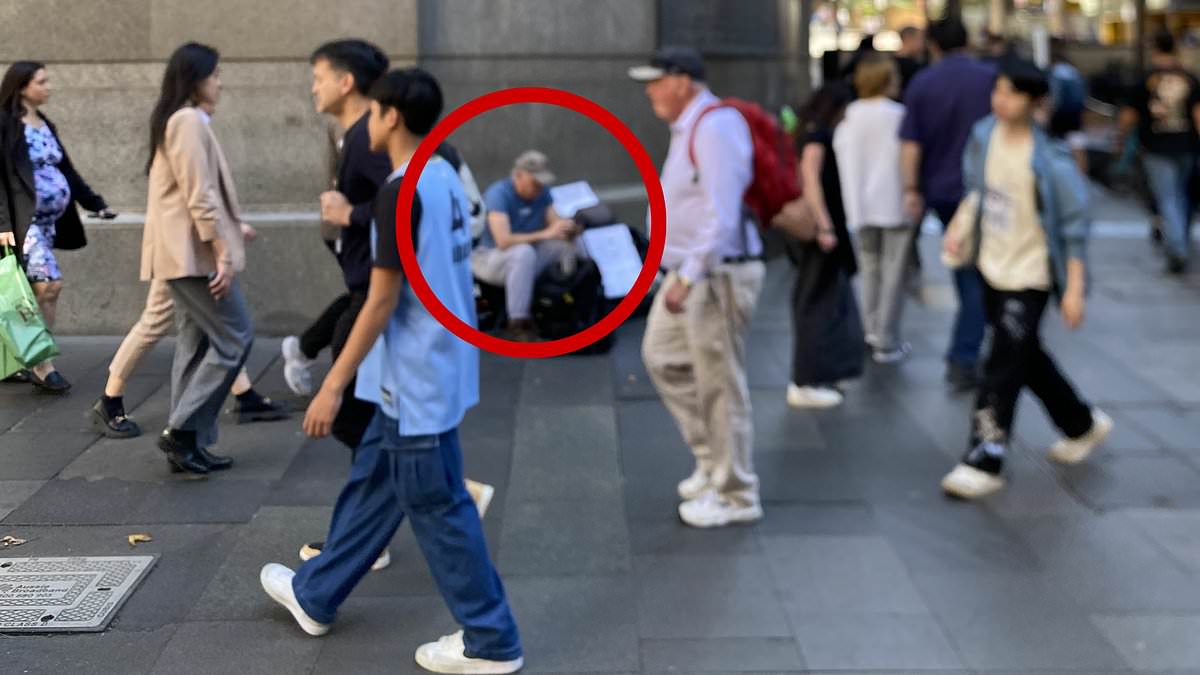Not many job-seekers would retain hope when every day hundreds literally look right past them but George Morrissey’s dedication to starting a new life in is hard to match.
Although many of those busily treading along Sydney’s pedestrian thoroughfare of George Street would pass by without a glance, Mr Morrissey keeps putting himself out there for long punishing days on the pavement advertising himself for work.
‘Brains for hire,’ says one of his colourful laminated signs.
‘Use my unique problem-solving ability and attention to detail, analytical ability and superb English in your business. Unleash my autistic brain.
‘This has gone through a lot of iterations, trying different formats,’ the 50-year-old New Zealander told Daily Mail about his eye-catching signs.
Mr Morrissey also hands out business cards and has an up-to-date LinkedIn page to enhance his hiring prospects.
However, he believed his age worked against him because Sydney was ’20-year-old’s town’.
After coming to from New Zealand a little over a year ago for a ‘mid-life change’ with the aim of studying science and mechanical engineering bachelor degrees, Mr Morrissey has been sleeping rough for the past eight months.
‘The first six months I was here I tried to do the conventional job agency thing … and absolute silence,’ Mr Morrissey said.
‘There’s a lot of misconceptions that New Zealanders in get the dole, no they don’t.
‘I came here with five grand but once your money runs out you are screwed.
‘ has got so damn expensive, it’s way more expensive than New Zealand now and it always used to be the other way around.’
Mr Morrissey said he survives now purely on donations, which another of his laminated sign invites with the phrase: ‘Contributions welcome’.
‘I float around the inner city because this is the only place you get working people on foot,’ he said.
However, he said on Saturday, Sunday, Monday and even Tuesday ‘you don’t make any money at all’.
‘There is nothing more soul-destroying than sitting here all day and getting $2,’ he said.
‘I don’t do the food line, the food vans, I buy my food. Sometimes I don’t make enough money to buy my food for the day.
‘But everyone is doing it tough not just me.
‘Then you will get very generous people, thank God for the generous people.’
Keeping up a reasonable level of presentation is important to Mr Morrissey and his hopes of eventually getting work.
‘I try and keep my clothes washed, I have one of those buzzers I cut my hair with,’ he said.
‘If I look like a bag of s**t nobody is going to take me seriously at all.
‘I don’t look like I am just hanging out because I am not hanging out.
‘I stopped drinking when I turned 30 because I knew it was bad for me, I don’t gamble, I don’t take drugs.’
Although he has not been offered any work from his pavement vigils he said there have been promising leads recently.
‘Last week I gave out a business card to a civil engineer, a software developer, someone who wanted an aid for their business, so it is starting to click with people but you’ve got to be out here a lot,’ he said.
‘It’s almost like a stickability thing, they will walk past you lots of times before they’ll actually stop.’
‘It’s the left-field people who will stop. It’s not the conventional people because they are like “just get a f***ing job”.’
Mr Morrissy’s last job was in New Plymouth, on the west coast of New Zealand’s North Island, in a sheet metal workshop.
‘My background pre-Covid is trades, so building, joinery, I had a maintenance business that I subcontracted to a mate. I am just a bit too old for that now,’ he said.
Mr Morrissey said he had the New Zealand equivalents of certificate 2 or 3 in retail, computing certificate level 3 and 2 and also could speak Maori and was a skilled ‘hammer hand’ (semi-skilled roofer or labourer).
‘My resume is three pages but it would run to seven pages if I put all my skills in there,’ he said.
The other major hurdle Mr Morrissey sees to his ready employment is also one he has chooses to advertise as a strength, his autism that he said was diagnosed 10 years ago.
‘The word autism on a resume is poison,’ he said.
‘I think the unemployment rate for us runs at about 38 per cent.’
When asked why he is so upfront about his condition, Ms Morrissey said employers will always ‘find out pretty quick’.
‘The moment you put me into a squeeze, you put me a pressure situation where I don’t know what I am doing , I don’t react to that well,’ he said.
‘In autism we call it a meltdown. A meltdown is a like an anxiety version of a panic attack and it’s horrible.’
Mr Morrisey said being open about his condition was ‘his voice, my statement to the world’.
‘People think autism is a mental illness, it’s not it’s a developmental one,’ he said.
‘To be in the higher end (of the spectrum) is almost like a curse, because you are just left, there is no money, there is no help, there is no support.
‘You end up explaining yourself a hell of a lot more than you should. People should know more than they do.’
Mr Morrissey said he wanted to show that autism had positives.
‘Why you hire me is my ability to think outside the square and that’s really an autistic thing,’ he said.
‘You can’t buy that sort of analytic ability to look at things differently and the fact that I have English as my first language and am very good at.’
